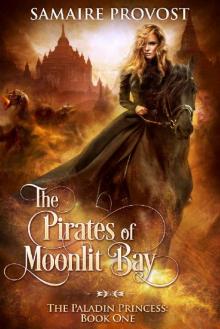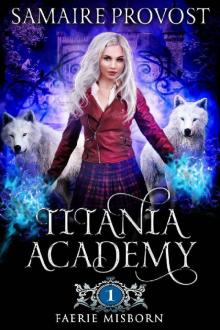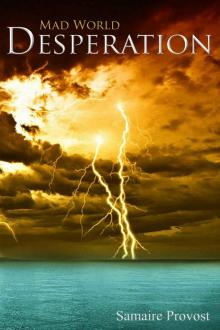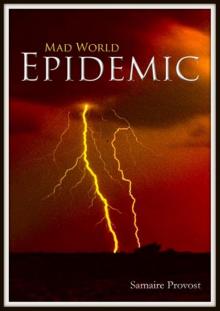- Home
- Samaire Provost
Faerie Misborn Page 2
Faerie Misborn Read online
Page 2
“And when Noelle woke up, it was nearly dawn. She had stayed in the faerie ring all night and she realized she had to get back to the hostel and check on her grandmother and friends. So she gathered up her things and ran back. When she returned, her grandmother was feeling better so they all went to eat, and then they continued the rest of their vacation in Ireland. And then they flew home.”
I held my breath.
“And then, just a few months later, Noelle noticed her period had stopped. She told me she’d thought the first missed month had been a fluke, but the second time it happened, she went out and bought a pregnancy test and took it at home. And it was positive.”
“She was frightened because her parents were extremely strict. They had only allowed her to go on her Irish vacation because her grandmother had insisted. But she knew they would become extremely mad when they found out she was expecting a baby. You see, Noelle was adopted, and therefore they expected more from her. “
“Noelle tried to hide her pregnancy while she prepared to start NYU in the fall. But she was very skinny, just like you, Holly. She wore loose-fitting clothes that summer, and she almost made it to the university without her parents finding out. But one morning, a week before she was about to leave, her mother walked in on her getting dressed, and saw her belly.”
“Well, there was a huge fight. The neighbors even called the police, because of the yelling. Her grandmother tried to intervene, but Noelle’s father was loud and rough, and he threw her out. She had just enough time to pack a small backpack with a change of clothes before her mother hustled her into the car and drove her to the bus station.”
“Noelle was frightened. Her mother bought her a ticket to the city, told her to go to a homeless shelter, and left. And that was it. Noelle was alone. She took the bus, and it was an all-night ride from Buffalo to New York City. Noelle said she cried all the way. When she arrived at the bus station in the middle of the city, she asked directions to the nearest homeless shelter and walked there. It took her hours, she said. But she made it, and we met there, and became best friends.”
“Aunt Clare, why did Mama’s parents kick her out? Didn’t they love her?” I asked.
“They probably did, in their own way, child. But sometimes people put pride and appearances before family, and that’s a shame. Because Noelle suffered, you see. She was small and skinny, and that winter, while she was in the homeless shelter, she caught a cough. And then you were born. And two days later Noelle was gone.”
I felt tears gather in my eyes. My heart constricted with loss.
I sniffled. Aunt Clare bent forward and gave me a hug.
“I know, Holly, I know.” She sat back again. “But what you must realize is that your mother loved you, more than anything else in the world. She loved you and she fought to get better and live, so you’d be together. I was with her in the shelter, I stayed beside her the whole two weeks after she had you. In the end, she was too weak, she just couldn’t hold on any longer.”
“And you adopted me,” I said, wiping my eyes.
Aunt Clare took a deep breath. “Yes, after a fashion. We had told the shelter workers and counselors that we were sisters. And I had been taking care of you since almost the beginning. So they knew I was your aunt. I think they were relieved. It was the end of fall, winter was coming and with it the snow and ice, and the overcrowding at the shelters.”
“The shelters,” I spat. Aunt Clare and I did not like the shelters. They didn’t let you keep your stuff. They were dirty and overcrowded, they always asked questions and they turned people over to the coppers just because they were hungry and had gone foraging.
“The shelters,” said Aunt Clare, “Are good for some people, but not for us. I stayed in the shelter for almost a year after your poor mama died. I finally had to leave.”
“They were mean to you!” I said.
“Well, mostly because it’s hard to be in a shelter. They toss you out in the early morning, and don’t let you back in until night, and they don’t let you have anything. We lost a lot to the shelters. We lost your mama’s stuff, and my stuff, and it was bad,” Aunt Clare said.
“But then you met Bobby!” I said.
“And then I met Bobby. My goodness child, you know this story by heart, don’t you?”
“I still want you to tell it.”
“Okay, I will tell it.” Aunt Clare thought for a moment. “Bobby. Yes, Bobby. Bobby was an old man I met when I was in the park after foraging. I had you strapped to my back; you were such a little thing. And quiet! My goodness, you were so quiet. Well, Bobby saw me on a bench, and you were on my back. I had you covered, to keep eyes from prying.”
“Bobby told me about the subway lines that were abandoned. He said there was places, places the people had found. Places to find that were okay. That I could stay in and shelter in. Bobby led me down there, into the subway, past the throngs, and down the line, and showed the way to get past the metal door, and through the tunnel they didn’t use anymore. And he showed me the cubbies. And I picked one out, and we’ve been down here ever since,” she grinned.
“I like it down here. No one can find us. The coppers don’t come down here,” I said.
“I don’t think they want to come down here, to tell you the truth,” Aunt Clare said.
“And we don’t want ’em down here, no way, no how,” I said.
“No, we don’t want them down here,” said Aunt Clare. “We want to be left in peace. And that’s all anyone ever wants, to be left in peace. To live our life the way we see fit, to forage...”
“To forage!” I said, my voice growing louder.
“To be silent, so we stay safe,” Aunt Clare whispered.
I nodded solemnly. I had forgotten.
“To forage and be silent,” I whispered.
“To stay hidden is to stay safe,” Aunt Clare patted my hand.
“Safe,” I repeated.
My eyes closed, and I lay down on the blanket, and held my bag close. I fell asleep to the sound of Aunt Clare’s wheezing.
Chapter Three
Alone
I woke up to the sound of Aunt Clare’s coughing.
“You’re getting sick again, Aunt Clare,” I said, sitting up and rubbing my eyes.
“Maybe, child,” Aunt Clare coughed again.
The candle had almost gone out, and I grabbed another one to light from the first.
“Oh, my,” Aunt Clare said as soon as the new candle caught, flaring into life in the small cubby.
I glanced over.
“Oh!” I exclaimed.
The rag Aunt Clare had been using to cough into was spotted with bright red blood.
“We need to get you to the clinic!” I said softly.
“No, no, I won’t go. They’ll just poke and prod me again, and I don’t need that trouble,” she said.
I looked at her, worried.
Another hour passed. I heated some water over the candle flame and added an old, used teabag, and gave it to her to drink. I had to hold her hand steady while she sipped at the chipped cup, but finally she drank it and lay back down on the mattress.
“I’m going to go forage. Will you be okay?” I whispered, worriedly.
Aunt Clare waved her hand at me. “I’ll be fine, child. I always get better after you make me tea,” she smiled weakly. “I hope you get more bread this time, that was delicious.”
I hugged her, then left to go.
The streets were cold. I ran through the park and down to the docks to see if anything interesting was going on there.
Then I made my way to the street with all the markets, and was able to gather an apple and a loaf of bread, and a real treat: a brownie out of the trash, with only one bite taken out of it.
Pleased, I made my way back underground.
The subway was loud and crowded, and as I slipped under the bar and started around the corner, a copper grabbed me.
Panic!
I tried to run, but he held on. He ha
dn’t grabbed much else but the shoulder of my coat, and I immediately dropped to the ground and rolled a few feet, shimmying myself out of the coat and down onto the track depression.
“Hey!” he called out, blowing his whistle.
But I was already gone.
I ran down the tracks and away from the station, hopped back up onto the walkway about a hundred yards down, and slipped through a fence.
Tears formed in my eyes as I crouched behind a wall. The copper had grabbed my coat, and winter was coming. But worse of all, when I’d shimmied out of my coat to get free, I’d had to let the bag of food go, too. It had been hanging off my coat on the other shoulder he hadn’t grabbed, and it had dropped onto the railway depression when I’d slipped away.
Now I had no food. After foraging for the whole day.
I crouched and allowed myself to cry. I was silent, and the bitter tears that ran hot down my face made no noise at all.
I decided to wait and try to go back when night fell. Maybe the bag was still there.
I walked down the tracks for several hours, unwilling to go back to the cubby empty-handed. Aunt Clare needed food, and would be crestfallen if she had to go hungry again, like that time last month when I was robbed.
Four boys had caught me in an alley and had teased me, and taken my bag off my shoulder. They’d laughed when they saw there was just a few bananas inside and no money, and had thrown the apples as hard as they could, up over the rooftops.
The apples had been lost.
They’d thrown my bag back to me, and called me ‘Little Orphan Annie’, whatever that meant.
I’d gone back home empty-handed that night, and both me and Aunt Clare had fallen asleep with growling stomachs.
This time would be different, I hoped.
I walked a long way, then turned around and headed back. I thought enough time had passed, but when I crept back and peeked around the corner, some people were still standing on the subway platform.
So I backed out of sight, and sat waiting on the side walkway another hour. I even curled up and dozed off at one point. Then I woke up, the passing train making a huge sound right in my face.
More than an hour might have passed.
I rubbed my eyes and peeked back around the corner. The coast was clear. The platform was empty. Everything was still.
It seemed like it was very late.
I crept back to where I thought I had fallen, and there it was: my bag of food!
It had gotten blown to the side of the depression, and hadn’t been run over by the tracks, thank goodness. I grabbed it and turned and ran.
“Aunt Clare? I’m back,” I whispered, lifting the edge of the metal grate and slipping inside the cubby.
Aunt Clare was asleep on the bed, and the candle had gone out.
“Why did you let it go out, Aunt Clare?” I fumbled in the dark for one of the precious matches we kept in a crack. “There’s only three more left,” I mumbled, feeling cross.
Matches were hard to come by. Candles were easier to find, though I wasn’t sure why.
I struck the match and held it to the next candle and the wick flamed to life, filling the small cubby with light.
“I got some bread and an apple, Aunt Clare,” I said, digging in my bag for the food.
I put it all on the blanket by the mattress and then put my hand on her shoulder, shaking it to wake her.
She wouldn’t wake up.
Something was wrong.
I carefully brought the candle over to her. The blanket was covering her face, and I had to lift it.
I gasped.
Aunt Clare’s eyes were closed, and there was blood on her mouth. Her hand clutched the rag she used to cough into, and I saw there was a lot of fresh blood on it. I looked back into Aunt Clare’s face, and touched her cheek.
It was cold.
“Aunt Clare?” I whispered. “Wake up, Aunt Clare!”
I set the candle down and turned her on her back, and listened to her chest. I couldn’t hear anything, though I listened for a heartbeat for a long time.
Finally, I sat back, stricken.
I just stared at her form, lying on the mattress.
She looked like she was sleeping.
“Aunt Clare,” I whispered, reaching out to touch her hand.
I didn’t want her to leave me.
I didn’t want to leave her.
I stared at her a long time, until my stomach rumbled loudly.
“Here,” I said softly, putting the bread on the blanket covering her form.
I sat and slowly ate the apple, and watched her, waiting, hoping she would wake up.
Finally, I curled up, and closed my eyes and fell asleep.
I slept for a long time, and I had no dreams that night, although I normally dreamed every night.
“Dreams are your imagination making up stories for you to hope for,” Aunt Clare had said. I could almost hear her voice.
I opened my eyes, thinking I had heard it. “Aunt Clare, oh, my goodness, I had the worst dream,” I said, sitting up.
The candle was barely lit, it was down to just a stub.
I looked over at Aunt Clare.
She hadn’t moved at all.
The bread was still on her; it hadn’t moved or fallen off.
I stared at her face for a long time, and the tears finally came, running copiously down my cheeks and making my shirt all wet.
Snot ran down my lip and I did nothing to stop it.
Aunt Clare ...
I cried for a long time, the apple, half eaten and forgotten, in my hand, which had dropped to my side.
Finally, I lapsed into silence, my gaze unfocused and a thousand miles away.
My chest felt tight, and I found it hard to breathe.
It was still as death in the cubby, and I realized: I have no one.
I am all alone now.
I felt a twinge of fear in my chest.
I glanced up at Aunt Clare’s body and felt mesmerized as the reality of the situation dawned on me.
I cannot move her; she is too heavy.
Well, maybe I could try.
I got to my feet and cleared the blankets away from her. I carefully set the bread aside, it would be madness to waste food. Then I stood back and considered the situation.
It was a long way to the tunnels still in use. But I knew of a place I could put her, where she would remain undisturbed, possibly forever.
I lifted her and moved her blanket underneath her. She had always loved this blanket, though the once-vibrant colors had dulled to a mottled brown and grey.
I thought for a moment and then took the apple, and with a dull knife Aunt Clare had kept in her bag, careful carved two perfect slices.
They were beautiful, and Aunt Clare would have loved to eat them. She always loved to eat slices of apple.
Food was the most valuable thing we had, food and each other.
We had no money, no coins. Carving the apple slices was like carving coins out of the apple.
I placed the two perfect apple slices over her eyes and stood back, surveying my work.
It will have to do.
I then carefully wrapped her in the blanket and then fished around in her bag for the old needle and thread she kept there, for fast repairs. I had no idea where she’d gotten hold of sewing supplies, but she’d always had them, for as long as I could remember.
The needle was dull, but would still do. I unwound the thread, a strong corded black thread made for sewing on buttons. It would do.
I carefully sewed the blanket, taking great care to keep my stitches small, as she had taught me.
Tears fell from my eyes onto the old, rough material as I worked. Aunt Clare had taught me everything I knew. Everything. From how to read and write and sew, to how to avoid the coppers, how to run the fastest, and how to jump a fence without tripping up.
Finally, I was done.
I propped open the metal grate, turned and grasped Aunt Clare by the feet, a
nd, backing out, managed to slowly pull her out onto the walkway that ran along the deserted subway line.
It was backbreaking work.
I turned to look and get my bearings.
The tunnel was deserted, most of the people who lived here were asleep or off foraging or something.
I didn’t know and I didn’t care.
My mind was on the task at hand.
I turned and began pulling her farther down the walkway, away from the civilized world, and deeper into the underground. It was hard work, but the blanket made it easier: It slid down the old cement smoothly, and didn’t catch on anything.
At one point, there was a dip in the cement and as I pulled her, I saw her head, wrapped in the blanket, drop with an audible ‘thunk’. Without thinking, I apologized.
“I’m sorry, Aunt Clare.”
I stopped short of asking if it had hurt her head.
Nothing can hurt her anymore.
The tears fell anew as I realized she had been sick for a while. She would always say it was nothing, that she would be just fine in the morning, but I realized she had known.
I’d offered to take her to the clinic many times in the last month, but she’d always insisted they would ‘do more harm than good’ and that she ‘just needed to rest’.
Her cough had gotten worse in the last few weeks, and she’d been coughing up blood more and more.
She knew she was dying.
I sobbed and straightened, and wiped my nose on my arm. After a minute, I bent and continued my task.
It took several hours.
I finally got to my destination: an old coal bunker, still coated in black soot. I opened the hatch and crawled in, pulling Aunt Clare in after me.
It was a small compartment, not much more than five feet square. But it was sealed. The steel sides had no cracks, no chinks, nowhere for the coal bits to fall through.
Aunt Clare and I had always said if there was any disaster, we’d hide in there. Even water couldn’t get in.

 The Pirates of Moonlit Bay
The Pirates of Moonlit Bay Faerie Misborn
Faerie Misborn Mad World (Book 3): Desperation
Mad World (Book 3): Desperation Mad World (Book 1): Epidemic
Mad World (Book 1): Epidemic